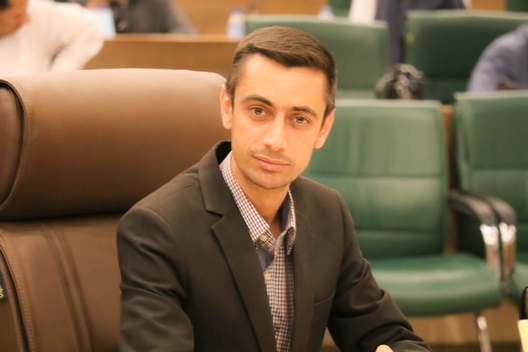 The Iranian constitution after the 1979 revolution provides limited freedoms for religious minorities, and it does not recognize the Baha’i community, with more than 300,000 members in the country. Instead, for four decades, the Islamic Republic has routinely harassed, prosecuted, and imprisoned Baha’is solely for practicing their faith. Among other things, the government severely restricts Baha’is right to education, including prohibiting Baha’i students from registering at universities and expelling them if their identities are discovered.
The Iranian constitution after the 1979 revolution provides limited freedoms for religious minorities, and it does not recognize the Baha’i community, with more than 300,000 members in the country. Instead, for four decades, the Islamic Republic has routinely harassed, prosecuted, and imprisoned Baha’is solely for practicing their faith. Among other things, the government severely restricts Baha’is right to education, including prohibiting Baha’i students from registering at universities and expelling them if their identities are discovered.
Yet several recent court decisions across the country, that have ended in the acquittal of Baha’is on vaguely defined national security charges, have led some to wonder if this blatant discriminatory behavior might finally be easing up.
On January 9, human rights defenders published a verdict from an Alborz province court of appeal that had acquitted a Baha’i citizen who had been sentenced to seven months in prison for “propaganda against the state.” The judge ruled that “merely proselytizing for the Baha’i faith cannot be considered propaganda against the state and, fundamentally, the law does not criminalize the belief in the Baha’i faith to justify prosecuting and punishing individuals with such a charge.”
Days later, on January 13, the Iranian activist website Human Rights Activists News Agency (HRANA) reported that a court of appeal in Kurdistan province acquitted a Baha’i woman who had been sentenced to one year in prison on similar charges. A day later, HRANA published the results of another acquittal case in the city of Shiraz, in Fars province. This time, a court of first instance had acquitted thirteen Baha’is arrested for closing their shops on a Baha’i holiday the year before. They had been charged with the crime of “propaganda against the state.”
This is possibly the first time that a court in Iran has ruled that proselytizing for the Baha’i faith is not a crime. And more broadly, verdicts of acquittal like these are certainly not common in the cases of Baha’i citizens. According to representatives of Baha’i International, as of November 13, 2018, at least seventy-nine Baha’i citizens were in prison. In fact, the authorities increased house raids and arrests of Baha’is across the country in August and September2018.
While the recent court cases are hopeful steps toward correcting the long-lasting harm against the Baha’is in Iran, there is very little to suggest a real change of approach by the Iranian judiciary. These rulings, however, point to a less visible societal shift in which political actors are speaking out against the persecution of Baha’is.
In the aftermath of 2009 presidential elections, Iranian authorities sentenced hundreds of Green Movement activists to prison, where their fellow inmates at the Evin and Rajai Shahr prisons included the seven leaders of Iran’s Baha’i community who were serving ten-year prison sentences. Fast forward to 2016: One of the detained Baha’i leaders, Fariba Kamal Abadi, was granted a temporary leave from prison. Faezeh Hashemi Rafsanjani, a former parliament member and daughter of the late President Akbar Hashemi Rafsanjani, who had met Abadi while also in Evin prison in 2012, visited her at her house. This rare act of solidarity with Baha’i leaders drew harsh criticism, including from her father.
In September 2018, Baha’i groups reported that at least fifty Baha’i students have been denied the ability to register in universities because of their faith. The origin of such long standing blatant discrimination reportedly goes back to a 1991 by-law of the High Council of Cultural Revolution, a body in charge of setting education policies, that mandates authorities to expel Baha’i students from higher education institutions. When asked about the situation on Twitter, Mahmoud Sadeghi, an outspoken member of parliament from Tehran said, “That is a violation of the right to education and against the Iranian constitution.”
Similarly, after authorities arrested twelve Baha’is in Shiraz in late August of 2018, Mehdi Hajati, a local city council member, tweeted that, “Over the past 10 days, I tried my best to secure the release of two Baha’i friends but have failed. While standing against the foreign enemy, our generation has a duty to do its best to reform the judicial processes and other issues that threaten social justice.” Judicial authorities detained Hajati for ten days and have since suspended him from his seat on the city council for his statement of support.
Iranian hardliners’ attempts to harshly punish politicians who speak out in support of Baha’is, however, appear to have failed to stem new support for Baha’i rights. And now this support has emerged from one of the most unlikely sources—the Iranian judiciary, normally a cornerstone of repression rather than a champion of change.
The recent spurt of judiciary rulings in favor of Baha’is facing blatantly unfair charges is reason for cautious optimism that societal and establishment views about the discriminatory treatment of Baha’is is starting to change. Such a change is long overdue, and reform-minded Iranians should escalate their calls for an end to this longstanding shameful discrimination and abuse against an entire community solely due to their faith.
Tara Sepehri Far is the Iran researcher at Human Rights Watch. Follow her on Twitter: @sepehrifar.
Image: Mehdi Hajati, the suspended Shiraz city council member (IRNA)
